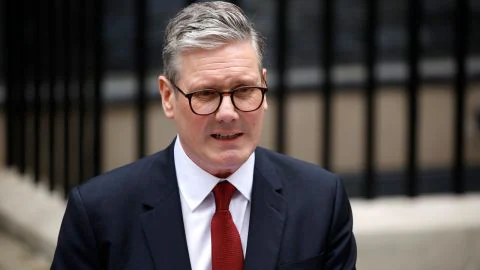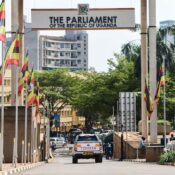
Following years of turmoil, Prime Minister Starmer promises to rebuild Britain
After years of turmoil and conflict, Britain’s new prime minister, Keir Starmer, promised on Friday to use his sizable election majority to rebuild the nation. He also expressed his desire to defuse the political climate.
Standing outside his new apartment and office at 10 Downing Street, Starmer recognized the magnitude of the task before of him following his party’s resounding win in a parliamentary election that brought an end to 14 years of frequently turbulent Conservative rule.
He cautioned that he would first need to restore his faith in politics and that any improvements would take time.
“Actions, not words, are the only way to cure this lack of trust. He answered, “I am aware of that.
“My government will serve you whether or not you voted for Labour; in fact, if you did not vote, I say to you straight – you will not be disappointed. One can use politics as a positive force. We’ll demonstrate that.
Huge applause met Starmer as he entered Downing Street, and he waited some time before speaking to greet and shake hands with aides and well-wishers. These images were evocative of Labour predecessor Tony Blair’s 1997 entry into office.
He spoke from behind a lectern, acknowledging that many Britons had lost faith in politics as a result of years of corruption and turmoil under the Conservatives, who had suffered a historic defeat in Thursday’s election.
“Because no matter how fierce the storms of history, one of the great strengths of this nation has always been our ability to navigate away to calmer waters,” Starmer said in response to the rejection, indicating that Britain was prepared for a fresh start.
LARGE MAJORITY
Following the enormous majority that the center-left Labour party secured in the 650-seat parliament, Rishi Sunak resigned on Friday morning, and then Starmer proceeded to see King Charles and was formally appointed prime minister.
He reiterated a campaign promise to prioritize nation over party, promising to battle daily to restore trust and to establish a “government unburdened by doctrine” in Britain.
To subtly oppose those who have dismissed our nation. We shall implement the clear directive you have given us in order to bring about change.”
This election’s outcome has turned British politics upside down. The Conservatives, the most successful party in the west, lost 250 legislators, including former prime minister Liz Truss and a record number of senior ministers, while Labour gained almost 410 seats, an increase of 211.
Voters punished Sunak’s Conservatives for a string of scandals, inadequate public services, and a cost-of-living issue, resulting in the worst performance in the party’s lengthy history.
Outside Downing Street, Sunak expressed his regret to the nation and said he would continue as Conservative leader until the party was prepared to name a successor.
“I have put my all into this work, but you have made it quite evident that the UK government needs to change, and your opinion is the only one that counts. I accept responsibility for this tragedy and have heard your frustration and rage.”
HARDY TRAIL AHEAD
Polls indicated that there was not much support for Starmer or his party, even after Starmer’s resounding victory. Owing to an anomaly in the UK’s first-past-the-post electoral system as well as low voter turnout, Labour won with less votes than it did in 2017 and 2019—the latter being its lowest seat-win total in 84 years.
Although the pound, British equities, and government bonds saw a slight increase on Friday, Starmer takes office at a time when the nation is dealing with a number of difficult difficulties.
The tax load on Britain is expected to reach its greatest level since shortly after World War Two; net debt is nearly equal to the country’s yearly economic production; living standards have declined; and public facilities, particularly the beloved National Health Service, which has been beset by strikes, are in dire need of repair.
Labour has already rolled back some of its most ambitious goals, including its major green expenditure pledges, and Starmer has pledged not to raise taxes on “working people.”
He has also pledged to eliminate the Conservative Party’s practice of deporting asylum seekers to Rwanda; yet, since immigration is a major electoral issue, he will also be under pressure to find a solution to halt the tens of thousands of people who are now crossing the Channel from France in small boats.
Earlier during a victory rally, Starmer added, “I don’t promise you it will be easy.” “Turning a nation is not the same as flipping a switch. It requires a lot of labor. We must work with patience and determination, and we must move right now.”
There were no surprises in his first choices of ministers for his senior staff.
With the policy briefs they had held in opposition, David Lammy became foreign minister, Rachel Reeves became Britain’s first female finance minister, and Angela Rayner became deputy prime minister.
The election results in Britain indicated an increase in support for the right-wing Reform party, headed by Nigel Farage. These results are consistent with previous trends in Europe, where the far-right has been on the rise.
However, in contrast to France, where Marine Le Pen’s National Rally party achieved unprecedented gains in Sunday’s election, the British public has overwhelmingly chosen a center-left party to effect change.
While Labour has stated that rejoining the EU is not an option, Starmer has pledged to strengthen ties with the EU following Brexit.
If Trump wins the presidential election in November, he might also have to collaborate with him. Through his social media company Truth Social, Trump has already congratulated Farage.
Starmer has committed to upholding London’s unwavering support for Ukraine in its conflict with Russia, even as he has pledged to bring about change on the home front. His foreign policy is similar to Sunak’s on many subjects.
The election win marks a remarkable comeback for Starmer and Labour, which friends and detractors alike claimed was in the throes of an existential crisis just three years ago when it seemed to have lost its way following its crushing defeat in 2019.
All Categories
Recent Posts
Tags
+13162306000
zoneyetu@yahoo.com



